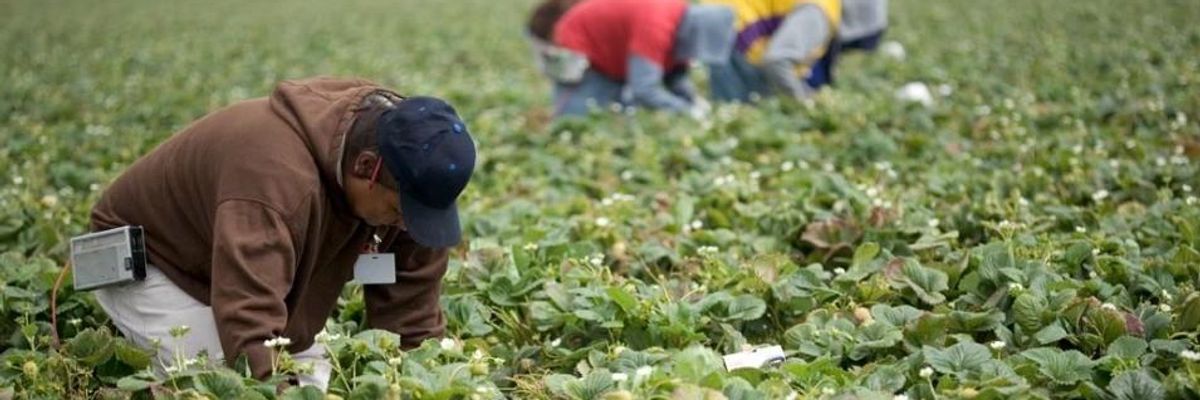While images of barren grocery store shelves grab headlines and circulate on social media as people worldwide stock up on staples to get through the ongoing coronavirus outbreak, farmers in the United States are warning that the Trump administration's decision to limit seasonal workers from Mexico could soon lead to labor and food shortages.
"Under the new restrictions, American farmers will not have access to all of the skilled immigrant labor needed at a critical time in the planting season. This threatens our ability to put food on Americans' tables."
--Zippy Duvall, American Farm Bureau Federation
The U.S. government announced Monday that "in response to the global pandemic COVID-19, and in line with the Mexican government's call to increase social distancing, the U.S. Embassy in Mexico City and all U.S. consulates in Mexico will suspend routine immigrant and nonimmigrant visa services starting March 18, 2020, and until further notice."
U.S. Agriculture Secretary Sonny Perdue reportedly told growers on a call Tuesday that consulates in Mexico will continue processing applications for returning guest workers under the H2A program--long criticized as exploitive--but will no longer process applications for new applicants, who represent up to 60% of the needed laborers.
The U.S. Department of Agriculture told multiple news outlets that it is "directly engaged with the State Department and working diligently to ensure minimal disruption in H2A visa applications during these uncertain times."
According toReuters, "Farmworker visas and other seasonal guest worker visas are still being processed in smaller countries including El Salvador and Guatemala."
Reuters reported Tuesday on U.S. fruit and vegetable growers "bracing for dramatic disruptions to their labor force" because of the guest worker changes:
While the harvesting of grains like wheat and corn is mostly automated in the United States, fruit and vegetable farmers rely on seasonal guest workers to pick their crops.
"When the process is stopped midstream, it likely means those crews won't be there exactly when they're needed, if they get there at all. That means lost crops. That means lost food," said Dave Puglia, president of the Western Growers Association, which represents fruit and vegetable growers in states including California and Arizona.
"Increasingly... we just don't have the labor force domestically. We're turning more and more to H2A workers because there's no other way to get our crops harvested and packed and off to consumers," he said.
Puglia warned foods that could soon be affected by the low guest worker numbers include broccoli, cauliflower, celery, leafy greens, melons, and radishes.
Robert Guenther, senior vice president for public policy at the United Fresh Produce Association, told Bloomberg that berries, cucumbers, and leafy greens will likely be impacted first but tree fruit like citrus, nectarines, peaches, and plums could be affected in May and June. He was frank in his assessment of the anticipated fallout of the new visa policy.
"There won't be anyone to harvest the crops," Guenther said. "It will be devastating to growers and ultimately to the supply chain and consumers. They won't have the food."
In a statement Tuesday, Zippy Duvall, president of the lobbying group American Farm Bureau Federation, emphasized that growers "remain committed to doing the work in the fields, orchards, and barns across the country to ensure Americans have access to healthy, affordable food," but also expressed concern about the labor limitations.
"The decision to halt visa application processing in Mexico will restrict the number of immigrant workers being allowed to enter the country," said Duvall. "Under the new restrictions, American farmers will not have access to all of the skilled immigrant labor needed at a critical time in the planting season. This threatens our ability to put food on Americans' tables."
"We fully support the administration's efforts to protect the public during this health crisis," Duvall added. "We are in constant contact with USDA, the State Department, and the White House. We have urged them to find safe, practical ways to admit farm laborers as emergency workers for visa purposes while still protecting public health."
Purdue said in a statement Tuesday that "if you have ideas or solutions for USDA, I urge you to reach out--we want to hear from the experts in the field."
"Food is essential all year round, but in the face of a pandemic it is critical the shelves remain stocked and supplies remain plentiful," Purdue acknowledged. "America's farmers and ranchers, and those on the front lines in the food service industry are doing their part."
In a video Tuesday, Purdue urged Americans to refrain from "hoarding" shelf-stable foods and claimed that U.S. food supply chains "remain strong."
The limits on guest workers from Mexico aren't the only immigration-related moves the federal government has made in response to the COVID-19 pandemic. The New York Timesreported Tuesday that the Trump administration will soon announce plans to send back to Mexico all asylum-seekers and undocumented immigrants who attempt to cross the southern border between ports of entry.
Although "the ports of entry would remain open to American citizens, green card holders, and some foreigners with proper documentation," according to the Times, "some foreigners would be blocked, including Europeans currently subject to earlier travel restrictions enacted by the administration. The entryways will also be open to commercial traffic."
Amnesty International USA advocacy director for the Americas Charanya Krishnaswami charged Wednesday that "the Trump administration's ban on asylum-seekers coming from Mexico has nothing to do with making Americans safer from the coronavirus pandemic." She accused the president of "engaging in fear-mongering to justify racist and discriminatory policies whose only purpose is to demonize people seeking safety."
"The Trump administration has already sent tens of thousands of asylum-seekers to harm's way in Mexico, forcing them to survive in dangerous and precarious conditions and exposing them to appalling risks of kidnapping, torture, and other abuses," Krishnaswami added. "Instead of doubling down on these failed tactics, the Trump administration should reverse these cruel and punitive policies and allow people to seek safety following the process required by U.S. and international law."

